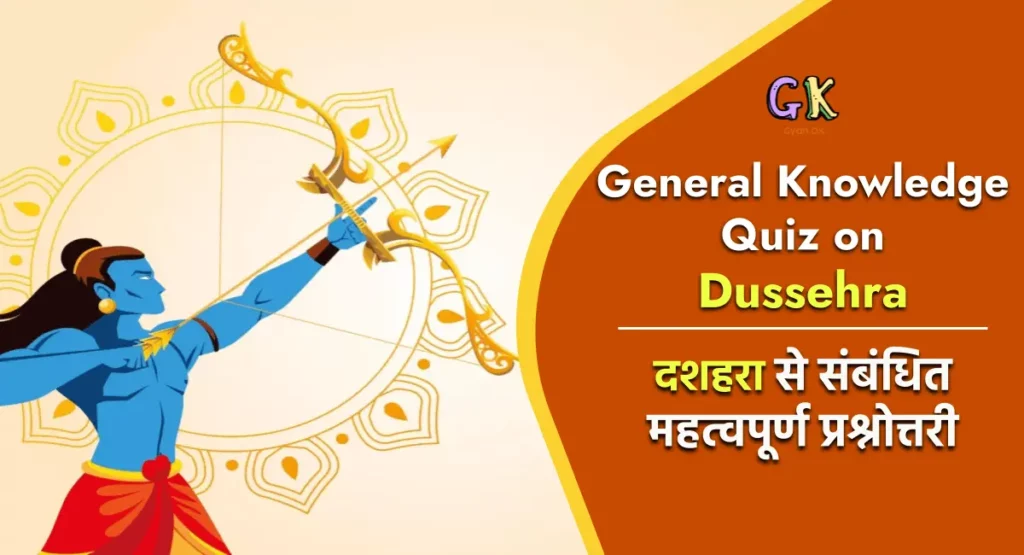Dussehra, celebrated with immense enthusiasm all over India, is an incredible festival that symbolizes the triumph of good over evil. The colourful processions, traditional rituals, and spectacular effigy burnings make it a truly mesmerizing and joyous occasion. To enhance your Dussehra celebration, we’ve crafted a fun quiz on this topic for you to explore and enjoy, allowing you to test your knowledge of this magnificent Indian festival.

General Knowledge Quiz on Dusshera
Dussehra is a significant Hindu festival celebrated with great fervour in India. It typically falls in September or October, marking the culmination of the nine-day Navaratri festival.
Following we have prepared a quiz on the topic of Dusshera for you to access your knowledge on the topic.
[–MCQ-QUESTIONS-DISPLAY–]
Why is Dusshera Celebrated?
Dussehra, also known as Vijayadashami, is a celebrated Hindu festival in India, rich in cultural and religious significance. This grand occasion is celebrated for several compelling reasons, each contributing to the festival’s depth and popularity.
The primary reason for celebrating Dussehra is to commemorate the triumph of good over evil. It marks the day when Lord Rama, an incarnation of the god Vishnu, defeated the demon king Ravana. According to the epic Ramayana, Lord Rama, along with his loyal brother Lakshmana and god Hanuman, waged a fierce battle against Ravana to rescue his beloved wife, Sita, who had been abducted by the demon king. The eventual victory of Lord Rama signifies the victory of righteousness, truth, and virtue over wickedness and deception.
Dussehra falls on the tenth day, signifying the conclusion of the nine-day Navaratri festival. Navaratri is dedicated to the goddess Durga, who embodies feminine power and strength. During this period, devotees engage in prayers, fasting, and elaborate rituals to seek the blessings of the goddess and invoke her divine energy. Dussehra, the culmination of Navaratri, is a momentous day to pay homage to the goddess and seek her grace.
Dussehra is also linked to historical events. It is believed that Mughal Emperor Akbar initiated the practice of celebrating Dussehra with grandeur during his reign. This tradition has continued, and today, it is observed with pomp and splendour in various parts of India, with effigy burnings, processions, and cultural performances.
One of the remarkable aspects of Dussehra is its ability to unite diverse cultures and regions within India. While the central theme remains the same – the victory of good over evil – the customs and traditions associated with Dussehra vary from region to region. In North India, Ramlila performances, depicting the life of Lord Rama, are held with great enthusiasm. In South India, the festival is dedicated to Goddess Saraswati, the embodiment of knowledge and art. In the eastern state of West Bengal, Dussehra coincides with the grand celebration of Durga Puja, where elaborate idols of the goddess are worshipped with fervor. In the western state of Gujarat, it marks the commencement of the vibrant Navaratri festival, known for its traditional Garba dance.
Dussehra is not merely a religious festival; it’s a cultural extravaganza that brings communities together to celebrate their shared heritage and values. It serves as a reminder of the timeless moral lesson that good will always prevail over evil, even in the face of adversity. The story of Lord Rama’s victory and the goddess Durga’s strength continues to inspire people to uphold truth, righteousness, and compassion in their lives.
